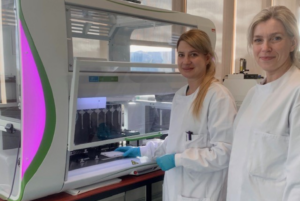Research
Establishing inhibition of MMP-14 as a viable therapeutic in Dupuytren's Disease
Dupuytren’s Disease is an abnormal thickening of a layer of tissue under the skin in the palm of the hand. Over time, this fibrosis can cause one or more fingers to curl towards the palm. It affects around 20% of people over 65, although it can also occur in younger people. Research has indicated that the incidence of this debilitating disease is likely to derive from a combination of genetic and environment factors. There is no cure or pharmaceutical therapy. Treatments include radiotherapy and surgery to release the affected tissue, although even after surgery recurrence is frequent and further intervention less successful.
This three-year research study at the Davidson Lab at the University of East Anglia builds on earlier studies highlighting the importance of genetic variations called single nucleotide polymorphisms (SNPs), and in particular the enzyme Matrix Metalloproteinase 14 (MMP-14), in the incidence and progression of Dupuytren’s Disease. Raised levels of MMP-14 are linked to the early recurrence of the disease after an operation. It aims to ascertain the phenotypic effect of the single nucleotide polymorphism (SNP) in the MMP14 gene through an ex-vivo clinical trial, using donated tissue from patients undergoing surgery as part of their treatment at Norfolk and Norwich University Hospital.

According to Miss Mira Pecheva, a Doctoral Research Fellow at Norwich Medical School, ‘Our previous data showed that MMP-14 has a key role in tissue contraction and it’s levels in the tissue correlate with post-operative recurrence. Not only does MMP-14 break down collagen, it also activates other enzymes and signalling molecules, so it plays an important role in the disease. In this study I’m looking at how this genetic variant affects the disease process. It’s also important to remember that Dupuytren’s disease has different phases and people can have various phases of the disease even within one hand. It’s fascinating, but also complex.
‘Using donated tissue from patients and talking to them before surgery about the research project helps me to see how the research can impact people directly. That’s very important, particularly when you are based in the lab, as it can feel quite distant from patients. Talking to patients is a valuable reminder of the real impact that disease has on them.
‘I hope that this will be another building block towards our understanding of the disease and finding a way for us to stop it from progressing and recurring. Many people have dedicated time to understanding this disease and we’ve come to realise that the more we study, the more there is still to learn.’
Acknowledgements – Dr Rosemary Davidson (primary supervisor), Professor Ian Clark (supervisor), Mr Adrian Chojnowski (clinical mentor).
Tell us your thoughts